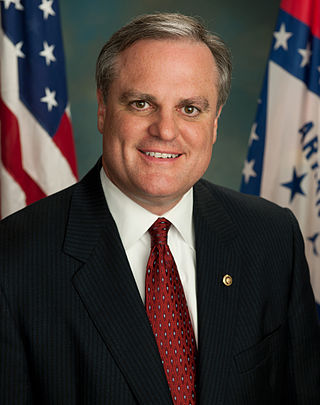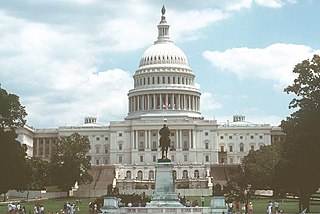
The National Security Act of 1947 was a law enacting major restructuring of the United States government's military and intelligence agencies following World War II. The majority of the provisions of the act took effect on September 18, 1947, the day after the Senate confirmed James Forrestal as the first secretary of defense.

Mark Lunsford Pryor is an American attorney, politician and lobbyist who served as a United States Senator from Arkansas from 2003 to 2015. He is a member of the Democratic Party. Prior to becoming senator, he was Attorney General of Arkansas from 1999 to 2003.

The Congressional Budget and Impoundment Control Act of 1974 is a United States federal law that governs the role of the Congress in the United States budget process.

William Sebastian Cohen is an American lawyer, author, and politician from the U.S. state of Maine. A Republican, Cohen served as both a member of the United States House of Representatives (1973–1979) and Senate (1979–1997), and as Secretary of Defense (1997–2001) under Democratic President Bill Clinton.
The Center for Defense Information (CDI) is a nonprofit, nonpartisan organization based in Washington, D.C. It specialized in analyzing and advising on military matters.

The 102nd United States Congress was a meeting of the legislative branch of the United States federal government, composed of the United States Senate and the United States House of Representatives. It met in Washington, D.C., from January 3, 1991, to January 3, 1993, during the last two years of George H. W. Bush's presidency. This is the most recent Congress where Republicans held a Senate seat from California.

The United States Intelligence Community (IC) is a group of separate United States government intelligence agencies and subordinate organizations that work both separately and collectively to conduct intelligence activities which support the foreign policy and national security interests of the United States. Member organizations of the IC include intelligence agencies, military intelligence, and civilian intelligence and analysis offices within federal executive departments.

The Committee on Armed Services is a committee of the United States Senate empowered with legislative oversight of the nation's military, including the Department of Defense, military research and development, nuclear energy, benefits for members of the military, the Selective Service System and other matters related to defense policy. The Armed Services Committee was created as a result of the Legislative Reorganization Act of 1946 following U.S. victory in the Second World War. The bill merged the responsibilities of the Committee on Naval Affairs and the Committee on Military Affairs.

The Project On Government Oversight (POGO) is a nonpartisan non-profit organization based in Washington, DC, that investigates and works to expose waste, fraud, abuse, and conflicts of interest in the U.S. federal government. According to its website, POGO works with whistleblowers and government insiders to identify wrongdoing in the federal government, and works with government officials to implement policy changes based on its investigations. POGO is led by executive director Danielle Brian.

The Intelligence Reform and Terrorism Prevention Act of 2004 (IRTPA) is a 235-page Act of Congress, signed by President George W. Bush, that broadly affects United States federal terrorism laws. The act comprises several separate titles with varying subject issues. It was enacted in response to the terror attacks of September 11, 2001.
Government Accountability Office investigations of the Department of Defense (DoD) are typically audits in which the Government Accountability Office (GAO), the United States Congress' investigative arm, studies how the Department of Defense spends taxpayer dollars. Since the GAO is accountable only to the legislative branch, it is in a unique position to investigate the military; no other agency can audit Federal departments with the same degree of independence from the President. However, the GAO is still subject to influence from powerful members of Congress. As of March 2016, the DoD was the only government agency to have failed every audit since all government agencies were required to pass such audits by the Chief Financial Officers Act of 1990.

The military budget is the largest portion of the discretionary United States federal budget allocated to the Department of Defense, or more broadly, the portion of the budget that goes to any military-related expenditures. The military budget pays the salaries, training, and health care of uniformed and civilian personnel, maintains arms, equipment and facilities, funds operations, and develops and buys new items. The budget funds five branches of the U.S. military: the Army, Navy, Marine Corps, Air Force, and Space Force.
The World Security Institute (WSI) was a Washington D.C.-based think tank committed to independent research and journalism on global affairs and security. Projects of WSI included the Center for Defense Information (CDI), Azimuth Media, the Pulitzer Center on Crisis Reporting, and Global Zero, among others. In the last several years of WSI's existence, Global Zero constituted more than 90% of WSI's operations.

The under secretary of defense for intelligence and security or USD(I&S) is a high-ranking civilian position in the Office of the Secretary of Defense (OSD) within the U.S. Department of Defense (DoD) that acts as the principal civilian advisor and deputy to the secretary of defense (SecDef) and deputy secretary of defense (DepSecDef) on matters relating to military intelligence and security. The under secretary is appointed as a civilian by the president and confirmed by the Senate to serve at the pleasure of the president.

Franklin C. "Chuck" Spinney is an American former military analyst for the Pentagon who became famous in the early 1980s for what became known as the "Spinney Report", criticizing what he described as the reckless pursuit of costly complex weapon systems by the Pentagon, with disregard to budgetary consequences. Despite attempts by his superiors to bury the controversial report, it eventually was exposed during a United States Senate Budget Committee on Defense hearing, which though scheduled to go unnoticed, made the cover of Time magazine March 7, 1983.

The United States Department of Defense is an executive branch department of the federal government of the United States charged with coordinating and supervising all agencies and functions of the U.S. government directly related to national security and the United States Armed Forces. The DoD is the largest employer in the world, with over 1.34 million active-duty service members as of June 2022. The DoD also maintains over 778,000 National Guard and reservists, and over 747,000 civilians bringing the total to over 2.87 million employees. Headquartered at the Pentagon in Arlington, Virginia, just outside Washington, D.C., the DoD's stated mission is to provide "the military forces needed to deter war and ensure our nation's security".

William James Lynn III is a former United States Deputy Secretary of Defense. Before that he was Under Secretary of Defense (Comptroller) and a lobbyist for Raytheon.

Robert Orton Work is an American national security professional who served as the 32nd United States Deputy Secretary of Defense for both the Obama and Trump administrations from 2014 to 2017. Prior to that, Work was the United States Under Secretary of the Navy from 2009 to 2013, and before that served as a colonel in the United States Marine Corps; Work retired in 2001 and worked as a civilian at the Center for Strategic and Budgetary Assessments (CSBA) and the George Washington University in various positions relating to military and strategic study. From 2013 to 2014, he was the CEO of the Center for a New American Security (CNAS). After his time as Deputy Secretary of Defense, he went on to serve on the board of Raytheon.

Paul Joseph Selva is a retired United States Air Force general who served as the tenth vice chairman of the Joint Chiefs of Staff. In this capacity, he was the nation's second-highest-ranking military officer, and the highest-ranking officer in the Air Force. He assumed his last assignment on July 31, 2015, and retired on August 1, 2019. Selva is a command pilot with more than 3,100 hours in the C-5, C-17A, C-141B, C-37, KC-10, KC-135A and T-37.

The National Defense Authorization Act for Fiscal Year 2014 is a United States federal law which specifies the budget and expenditures of the United States Department of Defense (DOD) for Fiscal Year 2014. The law authorizes the DOD to spend $607 billion in Fiscal Year 2014.













